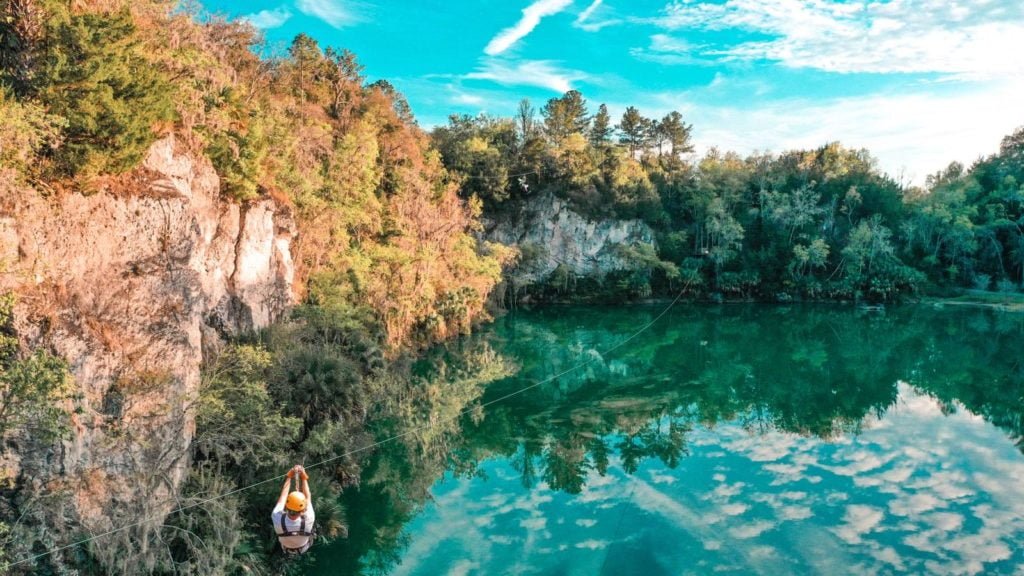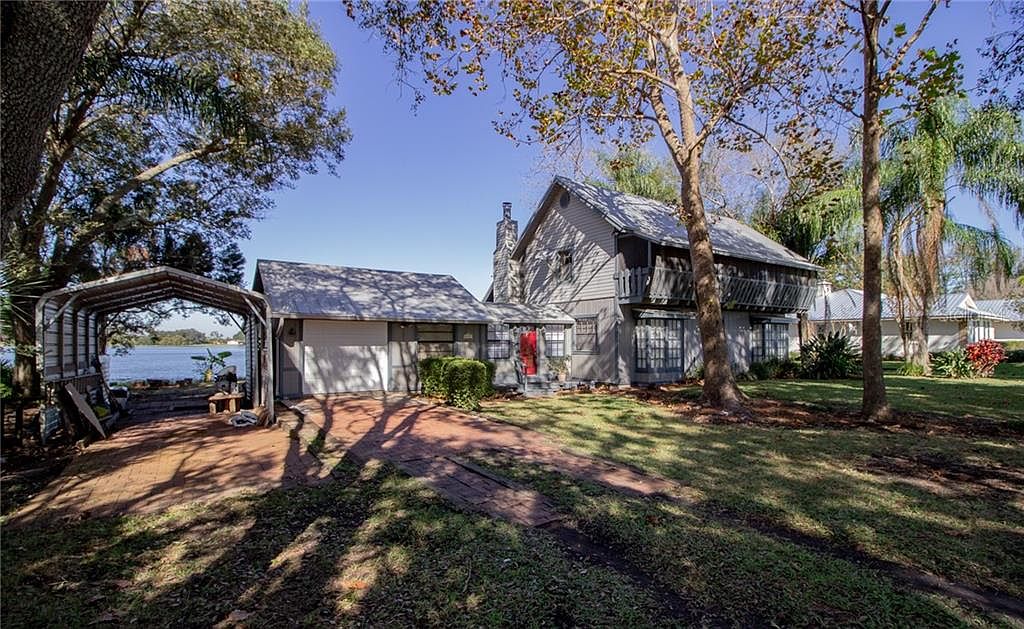It’s safe to say the Kissimmee Chain of Lakes is a freshwater angler's dream come true—particularly those in search of their next big bass. With more than 80,000 acres of water, the lakes offer plenty of amazing places to cast a line, and every local fisherman has a favorite spot. You can choose from a vast menu of options, from quick little drop-ins to full-day trips. This wonderland of fish camps and boat ramps welcomes every kind of angler, from first-timers to old-timers and everyone in between.

The Lay of the Land
The Kissimmee Chain of Lakes comprises eight main bodies of water in descending order of size: Lake Kissimmee, Lake Tohopekaliga (aka “Lake Toho”), East Lake Tohopekaliga (aka “East Toho”), Lake Hatchineha, Lake Marion, Lake Cypress, Lake Gentry, and Lake Jackson.
Lake Kissimmee is the chain’s biggest whopper, spanning nearly 35,000 acres in size. Thanks to its specific varieties of vegetation, it’s home to an impressive amount of crappie and wall-hanger sized bass. That’s without a doubt the reason the Bassmaster Classic and Florida Bass Federation Tour call Lake Kissimmee home. During those events and most days in between, the areas around North Cove and Brahma Island are known as reliably generous spots for anglers to try their luck.
The almost 19,000-acre Lake Toho (also referred to as “Big Lake Toho” or “West Lake Toho”) is known around the globe for its world-class bass fishing. Winter and early spring are prime time for reeling in the big ones with live bait, while the summer months are generally a better time of year for plastic worms and crankbait.
Lake Toho’s little sister, East Lake Toho, takes up just under 12,000 acres and, while smaller than its adjoining lake, is far clearer, with visibility up to 10-feet deep. The outer reeds of its Boggy Cove area are a known bass goldmine during the season, while July and August see lots of bluegills and shellcrackers there.

At this point, the lakes decrease rapidly in size; Lake Hatchineha, for example, spans about 6,600 acres, followed by Lake Marion (just over 5,700), Lake Cypress (a little above 4,900) and Lake Gentry, itself just shy of 1,800 acres. Last but not least (except in terms of volume), Lake Jackson is a 1,500-acre jewel of nearly untouched primitive beauty. Each lake in the chain has its own mythical array of secret spots frequented by locals and return visitors alike; to find your own, you’ll just have to pay the smaller parts of the chain a visit and stake out a winning hole.
View 3155 homes for sale in Cypress Lake, take real estate virtual tours & browse MLS listings in Vero Beach South, FL at realtor.com®.
Fresh Catch: The Best of What’s Around
Florida isn’t known as the “Bass Fishing Capital of the World” for nothing. Or as ESPN puts it, the area is “bass fishing’s magic kingdom” and “amazingly… Lake Toho is only one big drop of water in a zone of bass-thick central Florida lakes.” Still, in addition to trophy-worthy largemouth bass found in abundance across the Kissimmee Chain of Lakes, the area also offers up everything from bluegill and black crappie to shellcrackers and speck.
- 12 Homes For Sale in Cypress Lakes, FL. Browse photos, see new properties, get open house info, and research neighborhoods on Trulia.
- The goal of the Florida Atlas of Lakes is to provide a statewide lake information site for lake property owners, Florida LAKEWATCH volunteers, scientists, and other persons interested in Florida lakes. Cypress Lake is found within Hillsborough County - a Water Atlas sponsored area.
- And one of those is Blue Cypress Lake, one of the world’s largest osprey nesting sites, and boasts one of the top fishing spots in the world for crappie. Blue Cypress Lake is located in Indian River County, Fl. Blue Cypress Lake is the largest lake on the Treasure Coast. Again like the others above, it is the origin of the St.
- This is an absolutely gorgous old florida scenery free camping area. This primative site has a total if three spots. The equestrian site located further down has a total of 5 spots. The equestrian site had large 5th wheels and Class A's camping overnight. Th he dirt road in from the gate was easily managable. The sites were clean.
For an up-to-date tips and information as you plan your trip, check in with the Florida Fish and Wildlife Conservation Commission’s forecast system online, where you’ll find most of the chain’s lakes in the northeast region of the map.
While you’re in the area, be sure to register with the conservation commission’s TrophyCatch program, through which you can win prizes and help the state collect scientific information about its breeder fish, and in doing so contribute to the continued longevity of Florida’s bass fishing legacy.
Who Loves It
The vastness of the array of lakes in the Kissimmee chain lends itself well to all levels of fishing experience; in fact, strategic use of multiple ramps can grant access to several lakes in a single day, making even a diverse group outing with varying levels of expertise satisfying for everyone by the time the day is through. Loved equally by casual local fishing enthusiasts, visiting amateurs, and professionals alike, these lakes honestly have something for everyone. That—coupled with its abundance of bass, of course—is why it’s as attractive to famed events like the returning Bassmaster Tournament that takes place every year as it is to nearby residents who love spending an occasional morning on the water with their lines quietly cast, waiting for the next big catch.
Given that the state is a peninsula of course it has excellent coastal fishing! Florida’s freshwater fishing is great, too, though few people realize that. With an abundance of unspoiled natural habitats and year round good weather Florida makes for a perfect destination.
Florida’s coastal fishing opportunities are so lengthy that they could fill a book and still have room for a sequel! A few of the most popular sport fish of the sea are snook, sea bass, red snapper, tarpon, drum, and many more. If you elect to fish in the Gulf Stream you are likely to catch kingfish, swordfish, marlin, wahoo, and humongous tuna.
Out of all the Florida Keys the most noteworthy for fishing is Islamorada, although every Florida fisherman has his favorite. Islamorada has great amberjack, tuna, snapper, swordfish, grouper fishing, and many others. Currently Islamorada holds Florida’s record goliath grouper, amberjack, spearfish, and mackerel. No wonder it is so popular for catching trophies!
An excellent option for fine fishing and convention location is Biscayne Bay, within a half hour’s drive of Miami International Airport. Snook, grouper, tarpon, barracuda, and even shark swim in Biscayne’s waters. The state record fly fishing bonefish was also caught from Biscayne Key.
Florida has one of the most active artificial reef programs in the country. Oriskany Reef is the most popular, though more so with divers than anglers. The Oriskany Reef is home to amberjack, tuna, wahoo, grouper, and others.
For more adventure try shark fishing. Florida is home to tiger, hammerhead, white, spinner, mako, and more. Two state shark records bypass a thousand pounds! Deep water charters are the safest option given their experience and equipment.
Florida fishing is all about endless good choices. You can catch a bonito in Boca Raton or a white marlin off Miami beach. Or tell your friends that after lounging on a white sandy beach in Key West you caught trophy mackerel and barracuda. No matter where you go you are liable to bring home many unforgettable memories!
 Despite being best known for its saltwater fishing Florida has excellent inland fishing as well. This state is full of lakes, bayous, and channels. The best freshwater fishing is usually for bass, and Florida’s bass species are diverse! From largemouth to spotted, right down to the rarer sunshine bass, Florida has great inland fishing.
Despite being best known for its saltwater fishing Florida has excellent inland fishing as well. This state is full of lakes, bayous, and channels. The best freshwater fishing is usually for bass, and Florida’s bass species are diverse! From largemouth to spotted, right down to the rarer sunshine bass, Florida has great inland fishing.Some argue that it is the best lake in the state, but Lake George is an excellent bass fishery. Though its primary attraction is bass Lake George, the second largest lake in Florida, is also full of catfish, crappie, and bluegill.
Lake Kissimmee is also popular for sizable bass. Crappie fishing there is quite good too. There are several islands to explore or picnic on. Given its location in central Florida, it is perfect for an angler to escape to while the rest of the family goes to Disney.
Apalachicola River is renown for its bass, particularly striped, white, and sunshine bass. No other river in the state has more records; Apalachicola River holds the striped, spotted, shoal, and white bass records. No wonder people flock to it for trophies!
Sunshine bass make a change from the usual bass species, and are excellent proof of Florida’s successful stocking. Half a million of these hybrid of white and striped bass not found in nature are stocked annually. Other unusual Florida bass include the peacock and Suwannee bass. Suwannee bass can be found in the Ochlockonee River, and of course the Suwannee River.
The Florida Everglades is a unique, beautiful angling location. The most attractive species there is largemouth bass, and three or four pounders are not uncommon catches. Peak season is during spring. There are also chain pickerel, black crappie, oscar, warmouth, and Florida gar.
The Florida gar is a noteworthy species of this state. This prehistoric fish can be pulled from the Ochlockonee River, and any other low-oxygen rivers.
Anyone sixteen or older needs a license to fish in Florida. There are many kinds of licenses suitable to different purposes – such as the shoreline saltwater license – so think about what you need in a license before you buy. Freshwater and saltwater fishing requires individual licensure.
Residents and non-residents are both welcome to annual licenses. Residents enjoy the benefits of annual youth licenses and five year licenses. Lifetime licenses are only available to residents. Non-residents can brighten their vacation with a three or seven day license. Acceptable proof of residency includes a state driver’s license or state ID (required for online purchases). If one is a member of the military then their military orders will suffice. No minimum length of residency. Social security numbers are necessary.
Dating Spots Cypress Lake Flower
 There are many free fishing days; Florida has some for fresh and some for saltwater!
There are many free fishing days; Florida has some for fresh and some for saltwater!
Dating Spots Cypress Lake Flooding
Whenever you head out fishing to a new place, it's always best to speak to local anglers. Use fishing forums to ask questions and learn about the most accurate and up to date conditions.